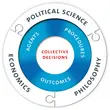
INOMICS Salary Report
Is an Economics PhD Worth It? The PhD Pay Premium
Read a summary using the INOMICS AI tool
Economics students may often wonder if doing a PhD is the right move for them. After all, you can still get a good job in economics with just a Master’s degree. We’ve covered different angles of this topic before with helpful advice about what degree you’ll need as an economist, asking whether you should do a PhD, and even asking what kinds of economists are paid the most. Thanks to INOMICS Salary Report 2023 data, we can look more closely at the pay benefit for an economics PhD in today’s job market. This will help you decide if doing an economics PhD will be worth it for your own career.
Perhaps unsurprisingly, the typical PhD in economics earns more than the typical economist with “only” a Master’s degree. But how much more? Is doing an economics PhD program worth it in the long term?
Suggested Opportunities
- Programma di Dottorato
- Posted 5 hours ago
DFG Graduate Program Collective Decision-Making
Starts 1 Nov at University of Hamburg in Hamburg, Germania
- PhD Program, Program, PhD Candidate Job
- Posted 6 days ago
Doctoral Position in Macroeconomics
At University of Konstanz in Konstanz, Germania
- Programma di Dottorato
- Posted 2 weeks ago
Ruhr Graduate School in Economics: fully funded PhD Program
Starts 1 Oct at Ruhr Graduate School in Economics (RGS Econ) in Dortmund, Germania
The short answer: yes. INOMICS Salary Report data shows that in 2023, economics PhDs earned on average 96% more than economists with a Master’s degree. These are worldwide statistics taken from the full breadth of the INOMICS Salary Survey data.
The benefit to doing a PhD in economics varies by region. Figure 1 compares the “earnings premium” that an economics PhD has over economists with a Master’s degree across the world, using 2023 INOMICS Salary Survey data.
Figure 1: Regional Premiums in economics PhD pay compared to a Master’s
Clearly, in most regions acquiring a PhD in economics offers quite the premium. Some results may stand out as surprising, however.
First, in North America in particular, the premium for earning a PhD in economics seems smaller than expected. If a PhD only earns an economist an extra 36% increase in wages, ignoring a PhD and continuing to work might seem like a preferred option in this high-wage region.
In the Caribbean, South & Central America and Africa, PhD earnings are below Master’s earnings. This unexpected result appears to be the case due to the distribution of survey respondents. In both regions, the amount of industry economist respondents is much larger than academic respondents, and Master’s-degree-holding economists outnumber PhD economists in Government, Central & International Bank, and private business roles. These three categories of employer tend to pay more highly than others. This suggests that in these two regions, acquiring a PhD may not be necessary to have a well-compensated industry career. Further, it seems more realistic for Master’s-degree-holding economists to attain high-paying roles in these sectors without a PhD, as opposed to many other regions where a PhD would be considered a requirement.
As the previous discussion just showed, Figure 1 doesn’t account for the different sectors that economists work in. In general, economists who work in industry tend to earn very high wages, while economists who work in academia earn noticeably less until they are finally promoted to a full Professor of Economics. Then, academic economist pay catches up to industry pay. This is a trend noted in multiple editions of the INOMICS Salary Report.
This is particularly true in North America, the highest-paying region on average. Economists working in industry can earn high wages with only a Master’s degree. This is also true of Western Europe & Scandinavia and East Asia & Australasia, the second and third highest-paying regions identified by the Report.
Some other regions of the world feature much more of a premium for PhD economists. Part of the reason for this is clear. Since high-paying regions like Western Europe and Australasia pay higher salaries to begin with due to the higher cost of living, a high pay increase in these regions represents a lower percentage of overall pay.
This fact is supported by the graph; North America is the highest-paying region and features the lowest positive percentage increase in pay for PhDs. Western Europe, which pays the second most on average, features a slightly higher percentage increase. Readers should make no mistake; a 35.6% increase from a base salary of $100,833 (the average Master’s degree economist salary in North America) is a massive increase in pay. Comparably, the almost 120% increase in pay in the Middle East, Central Asia & North Africa region is an increase from an average Master’s degree salary of $17,321 to almost $40,000. In percentage terms, this is obviously enormous, but in cash terms less than the difference in North America.
Additionally, however, the high percentage premium for PhD economists in lower-paying regions may suggest that in these regions (i.e., South Asia, Middle East) there are more opportunities for economists without a PhD to find meaningful employment, so fewer individuals elect to study for a PhD. If this is true, those who do complete a PhD enjoy a high pay premium over their economist peers since economics PhDs are more rare in those regions.
Academic economists need a PhD
Economics students should keep in mind that academic jobs will almost certainly require a PhD in economics. Economics students interested in a career in academia should therefore be strongly encouraged to pursue an economics PhD, regardless of differences in pay. The following Figure 2 shows the pay premium for economists employed at universities, by region:
Figure 2: Regional Premiums in economics PhD pay compared to a Master’s (Academic only)
The pay premiums for economics PhDs tells the story quite clearly: across the board, in every world region, economics PhDs in academia earn much more than their counterparts without a PhD.
Readers might note that this graph is likely skewed because economics PhDs are probably more senior economists than economists without a PhD in academic settings, and likely hold higher-level positions; but this skewness supports the point. Economists interested in a serious career in academia must strongly consider getting a PhD, or have a specific reason to not need one. It is very difficult to earn a Professor of Economics position without a PhD in most of the world. Figure 3 below provides evidence to support this point.
Figure 3: % of Master’s degree economists in Professor roles by region
Figure 3 shows very clearly that burgeoning economists should expect to earn a PhD if they wish to work as a Professor of Economics in the future. Every world region has very few Professors with just a Master’s degree. Even in South Asia, which has by far the largest representation for Professors with a Master’s degree in our data, only 20% of Professors have a Master’s while 80% have a PhD.
Industry economist roles
It’s clear that academic economists usually need a PhD, but this isn’t necessarily the case in industry. However, readers may be curious to repeat the above breakdowns in industry roles, which can be instructive. Figure 4 thus shows the pay premium for PhD economists in industry roles by region:
Figure 4: Regional Premiums in economics PhD pay compared to a Master’s (Industry only)
Figure 4 shows that PhD economists out-earn Master’s-holding economists in industry jobs by a substantial amount in most regions. The lower industry PhD economist pay compared to Master’s degree economists was already discussed above for Africa and the Caribbean. In summary, Master’s degree holding economists outnumber PhD economists in Government, Central & International Bank, and private business roles in these two regions. Since these three categories of employer tend to pay more highly than others, it may slightly skew the graph in favor of Master’s degree holders. However, this suggests that in these two regions, acquiring a PhD may not be necessary to have a well-compensated industry career.
In North America, part of the reason for a lower than expected premium is likely the fact that in this high-paying region, high base salaries mean that salary increases will be lower percentage-wise. This was discussed above as well. Average years of experience are quite comparable for industry economists in North America (about 12 for Master’s degree holders and 15 for PhD holders), and the employer distribution is relatively balanced.
Figure 4 suggests that industry economists with a Master’s degree in North America ought to consider their career path and whether a PhD is right for them before going back to school. A PhD opens up some employment opportunities in the private sector that aren’t available to Master’s degree holders, and will increase pay, but whether or not that is necessary or desired is likely up to the individual.
Keep in mind that specific non-academic employers – especially governments, central banks like the Federal Reserve, institutions seeking economics researchers, NGOs like the World Bank, and even increasingly consulting firms – are likely to require an econ PhD for some higher-level positions. Be sure to check job listings for economics jobs that you’re interested in to see if a PhD might help you reach them in your career.
Comparing previous years: PhD earnings on the rise again
Using past years of INOMICS survey data, we can examine how the benefit to doing an economics PhD has changed over time. It appears that the premium in pay that economics PhDs enjoy is recovering after a slight dip during the pandemic years. See below Figure 5 below:
Figure 5: How much more PhD economists earn vs. Master’s economists by year, INOMICS data
Figure 5 shows that earnings for economics PhDs are once again rising relative to pay for economists without a PhD. It’s worth noting that pay for economists with both degree types has increased this year. According to the latest INOMICS Salary Report, economists with a Master’s as their highest degree experienced a 3.2% increase in pay on average since 2022, while those with a PhD have experienced a 35.9% increase. This has widened the earnings premium between the two categories from 80% in 2022 to 91% in 2023.
The dip in pay that economists experienced in 2022 may be partially due to the COVID-19 pandemic. And PhD pay is not the only factor that appears to be improving since COVID. The post-pandemic recovery of the economics jobs market has already been discussed by INOMICS, showing that earnings for economists with Master’s and Bachelor’s degrees recovered sharply after the first waves of the pandemic.
So, is doing a PhD in economics right for you? According to the data, in most cases it will be. However, you must weigh the tradeoffs yourself. You may not need a PhD to have a fulfilling career in economics, particularly if you plan to work in a non-governmental and non-central bank role in industry, and particularly in certain countries and regions.
Header image credit: Freepik.de
-
- Programma di Dottorato
- Posted 2 weeks ago
4-year PhD in Economics
Starts 1 Nov in Bologna, Italia
-
- Postdoc Job
- Posted 1 week ago
BioNTech-Health Economics and Outcomes Research (HEOR) Postdoctoral Research Fellow
At Northeastern University London in Boston, Stati Uniti
-
- Scuole Estive
- Posted 1 week ago
Summer School on Modern Topics in Time Series Analysis 2026
Starts 7 Sep at Alpen-Adria Universität Klagenfurt in Klagenfurt am Wörthersee, Austria














